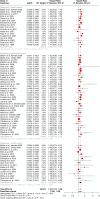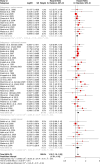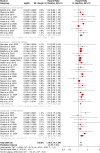Association between red and processed meat consumption and colorectal cancer risk: a comprehensive meta-analysis of prospective studies
- PMID: 40210826
- PMCID: PMC12181564
- DOI: 10.1007/s11357-025-01646-1
Association between red and processed meat consumption and colorectal cancer risk: a comprehensive meta-analysis of prospective studies
Abstract
Increasing evidence suggests that red and processed meat consumption may elevate the risk of colorectal cancer (CRC), yet the magnitude and consistency of this association remain debated. This meta-analysis aims to quantify the relationship between red and processed meat intake and the risk of CRC, colon cancer, and rectal cancer using the most comprehensive set of prospective studies to date. We conducted a comprehensive search in PubMed, Web of Science, Cochrane Library, Embase, and Google Scholar databases from 1990 to November 2024, to identify relevant prospective studies examining red, processed, and total meat consumption in relation to colorectal, colon, and rectal cancer risk. Hazard ratios (HR) and 95% confidence intervals (CI) were extracted for each study and pooled using a random-effects model to account for variability among studies. Statistical evaluation was executed using the online platform MetaAnalysisOnline.com. A total of 60 prospective studies were included. Red meat consumption was associated with a significantly increased risk of colon cancer (HR = 1.22, 95% CI 1.15-1.30), colorectal cancer (HR = 1.15, 95% CI 1.10-1.21), and rectal cancer (HR = 1.22, 95% CI 1.07-1.39). Processed meat consumption showed similar associations with increased risk for colon cancer (HR = 1.13, 95% CI 1.07-1.20), colorectal cancer (HR = 1.21, 95% CI 1.14-1.28), and rectal cancer (HR = 1.17, 95% CI 1.05-1.30). Total meat consumption also correlated with an elevated risk of colon cancer (HR = 1.22, 95% CI 1.11-1.35), colorectal cancer (HR = 1.17, 95% CI 1.12-1.22), and rectal cancer (HR = 1.28, 95% CI 1.10-1.48). This meta-analysis provides robust evidence that high consumption of red and processed meats is significantly associated with an increased risk of colorectal, colon, and rectal cancers. These findings reinforce current dietary recommendations advocating for the limitation of red and processed meat intake as part of cancer prevention strategies.
Keywords: Aging; Colon cancer; Colorectal cancer; Diet; Dietary; Dietary recommendation; Healthy aging; Meta-analysis; Processed meat; Rectal cancer; Red meat; Risk factor; Semmelweis Study.
© 2025. The Author(s).
Conflict of interest statement
Declarations. Ethics approval and consent to participate: NA. Consent for publication: NA. Conflict of interest: Dr. Balázs Győrffy serves as Associate Editor for GeroScience. Dr. Zoltan Ungvari serves as Editor-in-Chief for GeroScience and has personal relationships with individuals involved in the submission of this paper. Disclaimer: The content is solely the responsibility of the authors and does not necessarily represent the official views of the National Institutes of Health. The 4o version of ChatGPT, developed by OpenAI, and Claude 3.5 Sonnet, developed by Anthropic were used as a language tool to refine our writing and enhance the clarity of our work.
Figures





Similar articles
-
Meat consumption and colorectal cancer risk: an evaluation based on a systematic review of epidemiologic evidence among the Japanese population.Jpn J Clin Oncol. 2014 Jul;44(7):641-50. doi: 10.1093/jjco/hyu061. Epub 2014 May 19. Jpn J Clin Oncol. 2014. PMID: 24842864
-
Meat subtypes and their association with colorectal cancer: Systematic review and meta-analysis.Int J Cancer. 2016 Jan 15;138(2):293-302. doi: 10.1002/ijc.29423. Epub 2015 Feb 24. Int J Cancer. 2016. PMID: 25583132
-
Systematic Analysis of the Differential Effects of Red Meat on Colorectal Cancer Risks: A Meta-Analytic Approach.J Gastrointest Cancer. 2025 Aug 7;56(1):170. doi: 10.1007/s12029-025-01247-3. J Gastrointest Cancer. 2025. PMID: 40773080 Free PMC article. Review.
-
Association between red meat consumption and colon cancer: A systematic review of experimental results.Exp Biol Med (Maywood). 2017 Apr;242(8):813-839. doi: 10.1177/1535370217693117. Epub 2017 Jan 1. Exp Biol Med (Maywood). 2017. PMID: 28205448 Free PMC article.
-
Associations between the consumption of red meat and processed meat and the incidence of colorectal cancer in Asia: a meta-analysis.Front Med (Lausanne). 2025 Jun 9;12:1555717. doi: 10.3389/fmed.2025.1555717. eCollection 2025. Front Med (Lausanne). 2025. PMID: 40552180 Free PMC article.
Cited by
-
Western Diet and Cognitive Decline: A Hungarian Perspective-Implications for the Design of the Semmelweis Study.Nutrients. 2025 Jul 27;17(15):2446. doi: 10.3390/nu17152446. Nutrients. 2025. PMID: 40806031 Free PMC article. Review.
-
Global, regional, and national burden of colorectal cancer associated with diet high in red meat, 1990 to 2021: an analysis for the global burden of disease study and prediction to 2036.BMC Public Health. 2025 Aug 18;25(1):2824. doi: 10.1186/s12889-025-23712-1. BMC Public Health. 2025. PMID: 40826342 Free PMC article.
-
Vitamin D and Colorectal Cancer Prevention: Immunological Mechanisms, Inflammatory Pathways, and Nutritional Implications.Nutrients. 2025 Apr 15;17(8):1351. doi: 10.3390/nu17081351. Nutrients. 2025. PMID: 40284214 Free PMC article. Review.
References
-
- Keum N, Giovannucci E. Global burden of colorectal cancer: emerging trends, risk factors and prevention strategies. Nat Rev Gastroenterol Hepatol. 2019;16:713–32. - PubMed
-
- Ungvari Z, Fekete M, Fekete JT, Grosso G, Ungvari A, Gyorffy B. Adherence to the Mediterranean diet and its protective effects against colorectal cancer: a meta-analysis of 26 studies with 2,217,404 participants. Geroscience. 2024. 10.1007/s11357-11024-01296-11359, 10.1007/s11357-024-01296-9. - PMC - PubMed
Publication types
MeSH terms
LinkOut - more resources
Full Text Sources
Medical

